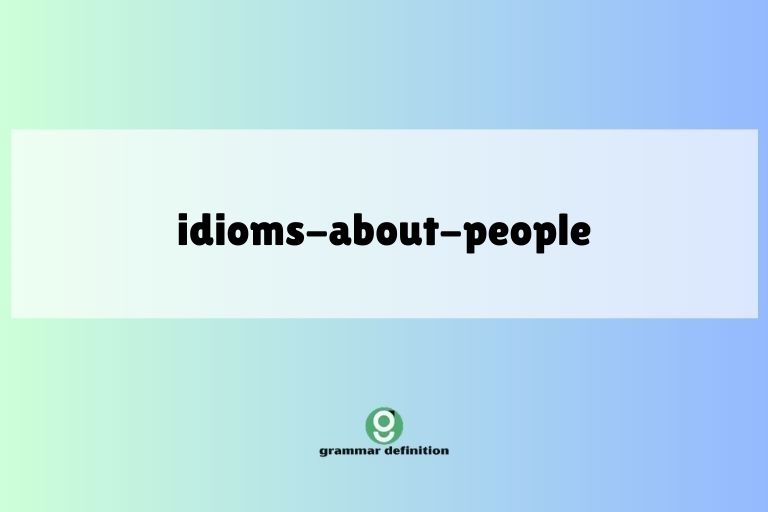Idioms About Sharing: Mastering English Expressions

Understanding idioms is crucial for mastering English, as they add color and depth to communication. Idioms related to sharing are particularly useful in expressing cooperation, generosity, and community spirit.
This article delves into a variety of idioms about sharing, explaining their meanings, origins, and proper usage. This comprehensive guide is perfect for English language learners, teachers, and anyone looking to enhance their understanding of idiomatic expressions.
By exploring these idioms, you will be able to communicate more effectively and understand nuanced conversations with greater ease.
Table of Contents
- Introduction
- Definition of Idioms About Sharing
- Structural Breakdown
- Types and Categories of Sharing Idioms
- Examples of Idioms About Sharing
- Usage Rules for Idioms About Sharing
- Common Mistakes When Using Sharing Idioms
- Practice Exercises
- Advanced Topics
- Frequently Asked Questions
- Conclusion
Definition of Idioms About Sharing
Idioms are expressions whose meanings cannot be understood from the literal meanings of the individual words. Instead, they carry a figurative or symbolic meaning known through common usage.
Idioms about sharing specifically refer to expressions that describe the act of distributing resources, responsibilities, or experiences with others. These idioms often highlight the social, emotional, and practical aspects of sharing, emphasizing concepts like cooperation, generosity, fairness, and mutual support.
These idioms can be classified based on the specific type of sharing they describe. Some idioms focus on the act of cooperation, where individuals work together and share responsibilities to achieve a common goal.
Other idioms emphasize generosity, highlighting the act of giving freely and sharing resources with others. Some idioms address the concept of equality, promoting fairness and equal distribution.
Finally, some idioms are related to burden sharing, where individuals collectively share the difficulties or responsibilities of a task or situation.
The function of idioms about sharing is to add nuance and color to everyday language. They allow speakers to express complex ideas and emotions related to sharing in a concise and memorable way.
By using these idioms, speakers can convey a deeper understanding of the social and emotional dynamics involved in sharing, making their communication more effective and engaging.
Structural Breakdown
The structure of idioms about sharing varies depending on the specific expression. However, many of these idioms follow common patterns.
Some idioms are phrased as verbs followed by prepositions, such as “chip in” or “split the difference.” These idioms often describe specific actions related to sharing. Other idioms are phrased as similes or metaphors, such as “go Dutch” or “share and share alike.” These idioms use figurative language to convey the concept of sharing in a more abstract way.
Understanding the structure of these idioms can help learners to better understand their meanings and usage. By recognizing common patterns, learners can more easily identify and interpret new idioms about sharing.
Additionally, understanding the structure of these idioms can help learners to use them correctly in their own writing and speaking.
For example, the idiom “chip in” follows a simple verb-preposition structure. The verb “chip” means to contribute, and the preposition “in” indicates that the contribution is being made to a larger effort or pool.
Together, the idiom “chip in” means to contribute money or effort to a common cause. Similarly, the idiom “split the difference” follows a verb-object structure.
The verb “split” means to divide, and the object “the difference” refers to the amount between two numbers or opinions. Together, the idiom “split the difference” means to compromise by meeting halfway.
Types and Categories of Sharing Idioms
Idioms about sharing can be categorized based on the specific aspect of sharing they emphasize. Here are some common categories:
Idioms About Cooperation
These idioms emphasize working together and sharing responsibilities to achieve a common goal. They often describe teamwork, collaboration, and mutual support.
Idioms About Generosity
These idioms highlight the act of giving freely and sharing resources with others. They often describe kindness, compassion, and selflessness.
Idioms About Equality and Fairness
These idioms address the concept of fairness and equal distribution. They often describe impartiality, justice, and equal opportunities.
Idioms About Burden Sharing
These idioms relate to collectively sharing the difficulties or responsibilities of a task or situation. They often describe mutual support, solidarity, and shared accountability.
Examples of Idioms About Sharing
Below are examples of idioms about sharing, organized by category, to illustrate their usage and meaning.
Examples of Cooperation Idioms
The following table provides examples of idioms related to cooperation, with their meanings and example sentences. Understanding these idioms will help you express collaborative efforts more effectively.
| Idiom | Meaning | Example Sentence |
|---|---|---|
| Chip in | To contribute money or effort to a common cause. | We all chipped in to buy Sarah a going-away present. |
| Pitch in | To help with a task or activity. | Everyone needs to pitch in to get this project done on time. |
| Pull together | To work together as a team. | If we all pull together, we can overcome these challenges. |
| Join forces | To combine efforts to achieve a common goal. | The two companies decided to join forces to develop the new technology. |
| Be on the same page | To have the same understanding or agreement. | It’s important that everyone is on the same page before we start the project. |
| Two heads are better than one | Working together can solve problems more effectively. | Let’s discuss this together; two heads are better than one. |
| Many hands make light work | A task is easier when many people help. | We finished the cleanup quickly because many hands make light work. |
| In cahoots | Working together secretly, often for a dishonest purpose. | The two politicians were in cahoots to rig the election. |
| Hand in glove | Working closely together, often in secret. | The police suspected that the two criminals were working hand in glove. |
| Row in the same boat | To be in the same situation or facing the same challenges. | We’re all rowing in the same boat, so let’s support each other. |
| Team player | Someone who works well with others. | John is a great team player and always helps his colleagues. |
| Work hand in hand | To cooperate closely. | The two departments work hand in hand to ensure the project’s success. |
| Cooperate and graduate | Emphasizes the importance of cooperation for success. | The teacher always says, “Cooperate and graduate,” to encourage teamwork. |
| Shoulder to shoulder | Standing or working together to face a challenge. | The community stood shoulder to shoulder to rebuild after the disaster. |
| All in this together | Everyone is part of the same group and shares the same fate. | Remember, we’re all in this together, so let’s support each other. |
| Get your heads together | To meet and discuss something as a group. | Let’s get our heads together and figure out a solution to this problem. |
| On board | In agreement and participating in a project or plan. | We need to get everyone on board with the new strategy. |
| Partners in crime | People who often do things together, sometimes mischievous or illegal. | The two friends were always partners in crime, getting into all sorts of trouble. |
| Collective effort | Effort made by a group working together. | The success of the project was due to the collective effort of the entire team. |
| In concert | Working together harmoniously. | The musicians played in concert, creating a beautiful melody. |
| Band together | To unite as a group for a common purpose. | The villagers decided to band together to protect their land. |
| One for all, all for one | Everyone supports each other. | The team’s motto was one for all, all for one, reflecting their solidarity. |
| Work as a well-oiled machine | To work together very efficiently. | The team works as a well-oiled machine, completing tasks quickly and effectively. |
| Synchronize your watches | To coordinate actions to happen at the same time. | Let’s synchronize our watches so we can launch the campaign simultaneously. |
| Together we stand, divided we fall | Unity is strength. | The community understood that together we stand, divided we fall, so they cooperated closely. |
Examples of Generosity Idioms
The following table illustrates idioms related to generosity, showing how to express acts of kindness and sharing. These examples help in conveying the spirit of giving and compassion.
| Idiom | Meaning | Example Sentence |
|---|---|---|
| Give the shirt off one’s back | To be extremely generous. | He would give the shirt off his back to help someone in need. |
| Share and share alike | To divide something equally. | The siblings agreed to share and share alike when they inherited the money. |
| Open one’s heart | To be receptive to others’ needs and feelings. | She opened her heart to the homeless and started a shelter. |
| Freehanded | Generous and giving. | The wealthy businessman was known for being freehanded with his donations. |
| Generous to a fault | So generous that it can be a problem. | He’s generous to a fault, often giving away more than he can afford. |
| Have a heart of gold | To be very kind and generous. | She has a heart of gold and always helps those in need. |
| Pay it forward | To do a good deed for someone who then does a good deed for someone else. | After receiving help, he decided to pay it forward by volunteering at the local soup kitchen. |
| A helping hand | Assistance or support. | She offered a helping hand to her neighbor who was struggling with groceries. |
| Charity begins at home | One should take care of their own family and community before helping others. | He believes that charity begins at home, so he focuses on helping his local community. |
| Go the extra mile | To do more than what is expected. | She always goes the extra mile to ensure her students succeed. |
| Benevolent | Kind and generous. | The benevolent donor gave a large sum of money to the hospital. |
| Openhanded | Generous and willing to give. | The king was known for being openhanded with his wealth, supporting many charities. |
| Be big-hearted | To be generous and compassionate. | He’s a big-hearted person who always puts others first. |
| Give freely | To give without expecting anything in return. | She gives freely of her time and resources to help those in need. |
| Good Samaritan | Someone who helps others, especially strangers, in need. | The Good Samaritan stopped to help the stranded motorist. |
| Kind-hearted | Having a kind and generous nature. | She is a kind-hearted woman who cares deeply about others. |
| A heart of gold | To be very kind and generous. | The volunteer has a heart of gold, always helping those less fortunate. |
| Be a giver | To be someone who enjoys giving to others. | He is a natural giver, always looking for ways to help people. |
| Reach out a hand | To offer help or assistance. | She reached out a hand to the new student, making her feel welcome. |
| Be of service | To be helpful and provide assistance. | He believes in being of service to his community and volunteers regularly. |
| A soft touch | Someone easily persuaded to give money or help. | He knew the manager was a soft touch and asked for a donation. |
| Be open to give | Willing to provide help or resources. | She is always open to give her time and support to worthy causes. |
| Share the wealth | To distribute resources or benefits more widely. | The company decided to share the wealth with its employees by giving bonuses. |
| Spread the love | To share positive feelings or resources with others. | She likes to spread the love by sending encouraging messages to her friends. |
| Be charitable | To be generous and giving to those in need. | It’s important to be charitable and support organizations that help others. |
Examples of Equality Idioms
This table presents idioms that emphasize equality and fairness, providing examples of how to discuss equal treatment and opportunities. These idioms are useful for promoting justice and impartiality in language.
| Idiom | Meaning | Example Sentence |
|---|---|---|
| A level playing field | A situation where everyone has an equal chance. | We need to create a level playing field for all students, regardless of their background. |
| Equal opportunity | The right to be treated without discrimination. | The company is committed to providing equal opportunity for all employees. |
| Fair and square | Honest and just. | The election was won fair and square without any cheating. |
| Give someone a fair shake | To give someone a fair chance. | We should give him a fair shake before making a judgment about his abilities. |
| Split the difference | To compromise by meeting halfway. | They couldn’t agree on the price, so they decided to split the difference. |
| Even the score | To get revenge or to make things equal after a perceived injustice. | He wanted to even the score after being unfairly treated by his opponent. |
| On equal footing | In a position of equality. | The two companies negotiated on equal footing, each with their own strengths. |
| Treat everyone the same | To show no favoritism or discrimination. | The teacher tries to treat everyone the same in her classroom. |
| All men are created equal | Everyone deserves the same rights and opportunities. | The founding fathers believed that all men are created equal. |
| Justice is blind | The legal system should be impartial and unbiased. | They say that justice is blind, but sometimes it doesn’t seem that way. |
| Fair share | A reasonable or just portion. | Everyone should get their fair share of the profits. |
| Across the board | Applying to all. | The pay raise was across the board, meaning everyone received the same percentage increase. |
| Without fear or favor | Impartially, without bias. | The judge ruled without fear or favor, ensuring a just outcome. |
| Equal rights | The same rights for everyone, regardless of their background. | The civil rights movement fought for equal rights for all citizens. |
| Equitable distribution | A fair distribution of resources or benefits. | The government aimed for equitable distribution of resources to reduce inequality. |
| In the same boat | Facing the same difficulties or circumstances. | We’re all in the same boat during this economic downturn. |
| Evenhanded | Impartial and fair. | The mediator was evenhanded in resolving the dispute. |
| A square deal | A fair agreement or transaction. | He always tries to give his customers a square deal. |
| Level the playing field | To create a situation where everyone has an equal chance. | The new policy aims to level the playing field for small businesses. |
| Give credit where credit is due | To acknowledge someone’s contribution or achievement. | Let’s give credit where credit is due; it was her idea that saved the project. |
| Cut the pie evenly | To divide something into equal portions. | The partners agreed to cut the pie evenly when dividing the profits. |
| What’s sauce for the goose is sauce for the gander | What is acceptable for one person should be acceptable for another. | If she can stay out late, then what’s sauce for the goose is sauce for the gander. |
| Treat with respect | To show consideration and value to others. | It’s important to treat everyone with respect, regardless of their background. |
| Equal access | The right to access resources or opportunities without discrimination. | The library provides equal access to information for all community members. |
| Fair game | Someone or something that is a legitimate target. | Once he announced his candidacy, he became fair game for criticism. |
Examples of Burden Sharing Idioms
The following table provides idioms related to burden sharing, illustrating how to express the idea of sharing responsibilities and difficulties. These idioms are valuable for discussing teamwork and mutual support in challenging situations.
| Idiom | Meaning | Example Sentence |
|---|---|---|
| Share the load | To divide responsibilities or tasks. | We need to share the load to prevent anyone from getting overwhelmed. |
| Carry the weight | To bear a heavy responsibility or burden. | She had to carry the weight of the project after her colleague left. |
| Shoulder the burden | To take on a responsibility or difficulty. | He shouldered the burden of caring for his sick mother. |
| Lighten the load | To make a task or responsibility easier. | We tried to lighten her load by helping with the housework. |
| Share the responsibility | To divide the accountability for something. | We all share the responsibility for the project’s success. |
| Spread the risk | To distribute potential losses or liabilities. | The company decided to spread the risk by investing in multiple projects. |
| All hands on deck | Everyone is needed to help with a task. | It’s all hands on deck to meet the deadline. |
| Divide and conquer | To break a task into smaller parts to make it easier to manage. | We decided to divide and conquer the project by assigning different tasks to each team member. |
| Two heads are better than one | Working together can solve problems more effectively. | Let’s put our heads together; two heads are better than one when facing this challenge. |
| Help each other out | To assist one another. | We always help each other out when someone is struggling. |
| Pull together | To work together as a team. | We need to pull together to get through this difficult time. |
| Stand by one another | To support each other in times of need. | We must stand by one another and offer support during this crisis. |
| In it together | Sharing the same experience or situation. | We’re in it together, so let’s support each other. |
| Share the pain | To experience the same difficulties or suffering. | We all share the pain of losing a loved one. |
| Pick up the slack | To take on extra work when someone else is unable to do it. | When John was sick, Mary had to pick up the slack and cover his duties. |
| Take up the mantle | To assume a leadership role or responsibility. | When the CEO retired, his daughter took up the mantle and led the company. |
| Double up on efforts | To increase efforts in order to achieve a goal. | We need to double up on efforts to meet the increased demand. |
| Make sacrifices together | To give up something for the benefit of the group. | We had to make sacrifices together to save the company from bankruptcy. |
| Lean on each other | To rely on each other for support. | During the crisis, we learned to lean on each other for emotional support. |
| Take the heat | To accept criticism or blame for something. | The manager had to take the heat for the project’s failure. |
| Be in the trenches together | To be involved in the difficult, day-to-day work together. | The team was in the trenches together, working long hours to launch the product. |
| Weather the storm | To survive a difficult period. | By working together, we can weather the storm and emerge stronger. |
| Carry one’s own weight | To be responsible for one’s own share of the work. | Everyone needs to carry their own weight to ensure the project’s success. |
| Put in extra hours | To work beyond the normal working hours. | The team had to put in extra hours to meet the deadline. |
| Share the credit | To acknowledge the contributions of others. | It’s important to share the credit with the team for their hard work. |
Usage Rules for Idioms About Sharing
When using idioms about sharing, it’s important to consider the context and audience. Idioms are often informal and may not be appropriate in all situations.
In formal writing or speaking, it’s usually best to use more direct and literal language. However, in casual conversations and informal writing, idioms can add color and depth to your communication.
Another important rule is to use idioms correctly. Idioms have specific meanings and cannot be altered without changing their meaning or making them nonsensical.
It’s also important to be aware of the cultural context of idioms. Some idioms may be specific to certain regions or cultures and may not be understood by everyone.
For example, the idiom “go Dutch” means to split the cost of a meal or activity. It’s important to use this idiom correctly, as using it incorrectly could lead to misunderstandings or offense.
Similarly, the idiom “chip in” means to contribute money or effort to a common cause. It’s important to use this idiom in a context where contributions are being made, as using it in a different context would be inappropriate.
Common Mistakes When Using Sharing Idioms
One common mistake is using idioms out of context. For example, using “give the shirt off one’s back” to describe a minor act of generosity is an exaggeration and could sound insincere.
Another mistake is misinterpreting the meaning of an idiom. For instance, thinking “go Dutch” means one person pays for everything is incorrect.
Another frequent error is altering the wording of an idiom. Idioms are fixed expressions, and changing the words can alter the meaning or make the phrase incomprehensible.
For example, saying “share and share equally” instead of “share and share alike” is incorrect. Also, using idioms in formal contexts where literal language is more appropriate can make the writing or speech seem unprofessional.
Here are some examples of common mistakes:
| Incorrect | Correct | Explanation |
|---|---|---|
| He gave the pen off his back. | He gave the shirt off his back. | The idiom is “shirt,” not “pen.” |
| Let’s go English tonight. | Let’s go Dutch tonight. | The idiom is “Dutch,” not “English.” |
| They chipped on the bill. | They chipped in on the bill. | The correct preposition is “in.” |
| Pull together our socks. | Pull together. | “Pull together” is the complete idiom. |
| Share and share equally. | Share and share alike. | The correct form is “alike.” |
Practice Exercises
Test your understanding of idioms about sharing with these exercises. Fill in the blanks with the correct idiom from the list provided.
Idiom List: chip in, pitch in, pull together, share and share alike, give the shirt off one’s back, go Dutch, level playing field, shoulder the burden, all hands on deck, split the difference
| Question | Answer |
|---|---|
| 1. We all need to _______ to finish this project on time. | pitch in |
| 2. Let’s _______ and each pay for our own meal. | go Dutch |
| 3. Everyone should _______ to create a fair environment. | level playing field |
| 4. The team had to _______ to overcome the difficult challenge. | pull together |
| 5. They decided to _______ when they couldn’t agree on the price. | split the difference |
| 6. He would _______ to help anyone in need. | give the shirt off one’s back |
| 7. We all need to _______ to buy a gift for the teacher. | chip in |
| 8. She had to _______ of caring for her elderly parents. | shoulder the burden |
| 9. It’s _______ to meet the deadline. | all hands on deck |
| 10. The siblings decided to _______ when dividing their inheritance. | share and share alike |
Exercise 2: Choose the correct idiom to complete the sentence.
| Question | Options | Answer |
|---|---|---|
| 1. We need to _______ if we want to succeed. | (a) join forces, (b) split hairs, (c) beat around the bush | (a) join forces |
| 2. He is always willing to _______. | (a) lend a hand, (b) bend the rules, (c) break the ice | (a) lend a hand |
| 3. Let’s _______ and work together to solve this problem. | (a) get our ducks in a row, (b) get our heads together, (c) get off our high horse | (b) get our heads together |
| 4. The company believes in providing _______. | (a) a level playing field, (b) a bed of roses, (c) a piece of cake | (a) a level playing field |
| 5. During the crisis, we had to _______. | (a) weather the storm, (b) bark up the wrong tree, (c) bite the bullet | (a) weather the storm |
| 6. She has _______ and always helps those in need. | (a) a heart of gold, (b) a chip on her shoulder, (c) a bee in her bonnet | (a) a heart of gold |
| 7. We are _______ in this project, so let’s cooperate. | (a) all in this together, (b) all Greek to me, (c) all thumbs | (a) all in this together |
| 8. It’s important to _______ to those who deserve it. | (a) give credit where credit is due, (b) give someone the cold shoulder, (c) give someone a taste of their own medicine | (a) give credit where credit is due |
| 9. The partners agreed to _______ when dividing the profits. | (a) cut the pie evenly, (b) cut corners, (c) cut to the chase | (a) cut the pie evenly |
| 10. We need _______ to get this done quickly. | (a) All hands on deck, (b) Back to the drawing board, (c) Call it a day | (a) All hands on deck |
Advanced Topics
For advanced learners, understanding the nuances of idioms about sharing involves recognizing how these expressions are used in different contexts and cultures. Some idioms may have historical origins that shed light on their current meanings.
For example, the idiom “go Dutch” is believed to have
been coined during the Anglo-Dutch wars and originally had a negative connotation, implying that the Dutch were stingy. However, over time, it has evolved to simply mean splitting costs.
Exploring the etymology and historical context of these idioms can provide a deeper understanding of their usage and cultural significance. Additionally, comparing idioms across different languages and cultures can reveal interesting similarities and differences in how sharing is perceived and expressed.
For instance, some cultures may have idioms that emphasize communal sharing, while others may focus on individual generosity.
Furthermore, analyzing the use of idioms in literature and media can provide valuable insights into how these expressions are used to convey complex ideas and emotions. By examining the context in which these idioms are used, learners can gain a more nuanced understanding of their meaning and usage.
Frequently Asked Questions
- Q: Why is it important to learn idioms about sharing?
- A: Learning idioms about sharing enhances your ability to communicate effectively and understand nuanced conversations. These idioms add color and depth to your language, allowing you to express complex ideas and emotions related to cooperation, generosity, and fairness.
- Q: Are idioms about sharing used in formal writing?
- A: Idioms are generally informal and may not be appropriate for formal writing. In formal contexts, it’s best to use direct and literal language to avoid any ambiguity.
- Q: Can I change the wording of an idiom?
- A: No, idioms are fixed expressions, and changing the wording can alter the meaning or make the phrase incomprehensible. It’s important to use idioms as they are commonly known.
- Q: How can I improve my understanding of idioms about sharing?
- A: To improve your understanding, read widely, listen to native speakers, and practice using idioms in context. Pay attention to how idioms are used in literature, media, and everyday conversations.
- Q: What should I do if I’m unsure about the meaning of an idiom?
- A: If you’re unsure about the meaning of an idiom, look it up in a dictionary or online resource. Pay attention to the context in which the idiom is used to understand its meaning better.
- Q: Are there any cultural considerations when using idioms about sharing?
- A: Yes, some idioms may be specific to certain regions or cultures and may not be understood by everyone. Be mindful of your audience and the cultural context when using idioms.
- Q: How do I avoid common mistakes when using idioms about sharing?
- A: To avoid common mistakes, learn the correct meanings of idioms and practice using them in context. Be aware of the potential for misinterpretation and avoid using idioms in formal situations where literal language is more appropriate.
Conclusion
Mastering idioms about sharing is an essential step in achieving fluency in English. These expressions add richness and depth to your communication, allowing you to express complex ideas and emotions with greater precision.
By understanding the meanings, origins, and usage rules of these idioms, you can enhance your ability to communicate effectively and connect with native speakers on a deeper level. Whether you are cooperating on a project, expressing generosity, promoting fairness, or sharing burdens, these idioms provide valuable tools for navigating the nuances of the English language.






